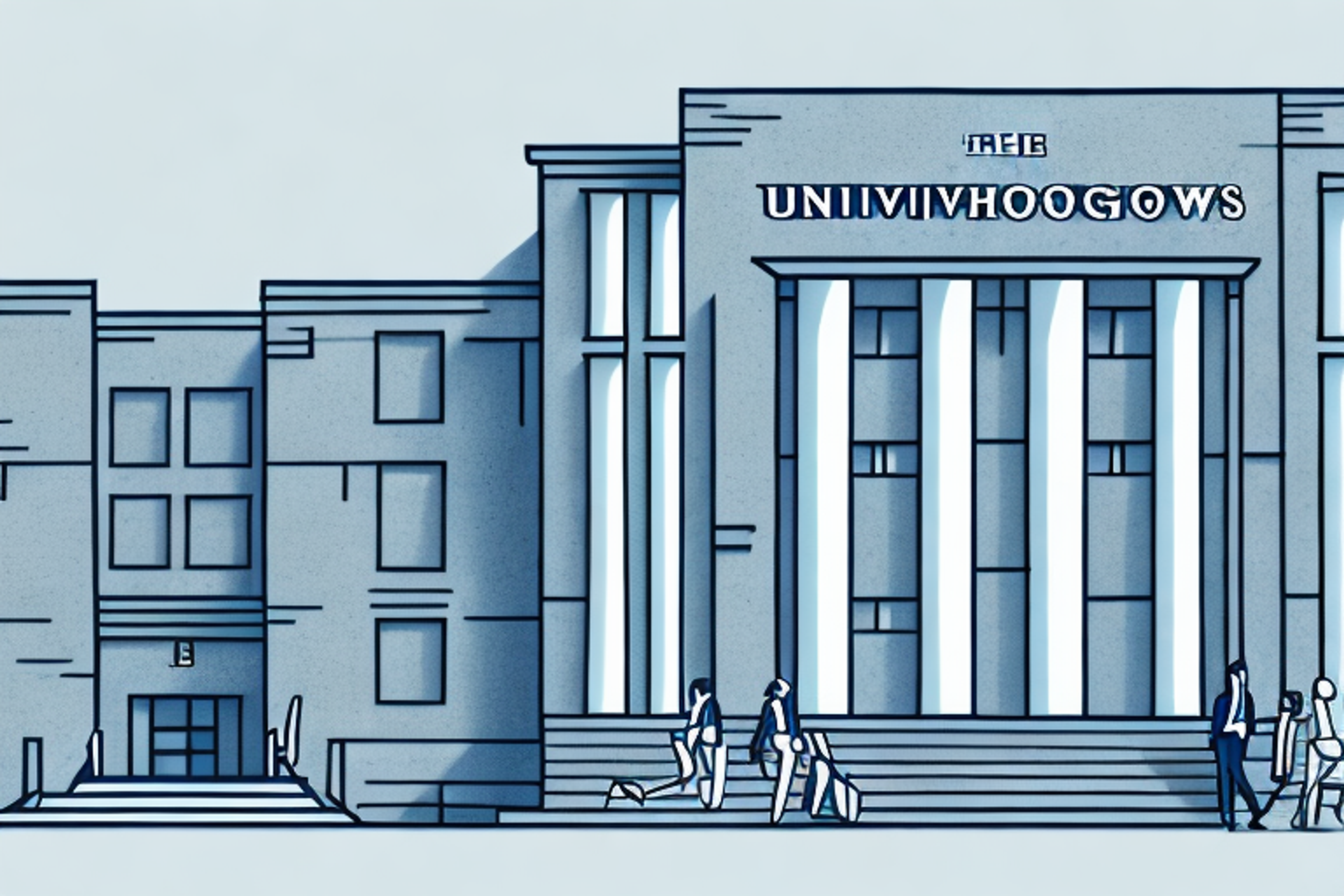University of Connecticut School of Law: Program and Application Overview
Discover the University of Connecticut School of Law's program and application process in this comprehensive overview.
Posted March 6, 2025

Table of Contents
Are you considering attending law school? If so, the University of Connecticut School of Law (UConn Law) should be at the top of your list. In this in-depth overview, we will explore everything you need to know about UConn Law, including its history, curriculum, faculty and staff, admissions requirements, and career opportunities. By the end of this article, you'll have a comprehensive understanding of what makes UConn Law stand out and how to apply to this prestigious institution.
Choosing the Right Law School: Why UConn Law Stands Out
When it comes to law schools, there are a plethora of options to choose from. However, UConn Law stands out for its commitment to innovation, diversity and inclusion, and community engagement. Since its founding in 1921, UConn Law has sought to provide a unique legal education, grounded in theory and practice. Today, UConn Law is known for its highly regarded faculty, rigorous coursework, and emphasis on values such as public service and the rule of law.
A Brief History of University of Connecticut School of Law
Founded in 1921, UConn Law was initially housed in what was known as the "Pantry Building" on the university's main campus in Storrs. However, by the 1970s, demand for legal education had grown so much that a new, dedicated law school building was necessary. In 1976, the William F. Starr Hall was opened and has been the home of UConn Law ever since. Today, UConn Law continues to be an important part of the University of Connecticut, and its graduates have excelled in various fields, including business law, public interest law, and criminal law, to name a few.
Over the years, UConn Law has also established itself as a leader in legal research and scholarship. The law school has several research centers and institutes, including the Insurance Law Center, the Center for Energy and Environmental Law, and the Human Rights Institute. These centers provide students with opportunities to engage in cutting-edge research and to work with faculty members who are experts in their respective fields. Additionally, UConn Law faculty members have published numerous books and articles on a wide range of legal topics, further cementing the law school's reputation as a top-tier institution.
Location and Campus: What to Expect at UConn Law
Located in Hartford, Connecticut, UConn Law provides students with access to various opportunities for internships, externships, and networking. The campus is located near several courts, law firms, and government offices, providing easy access and convenient opportunities for students to gain practical legal experience. Additionally, the campus features state-of-the-art facilities, including a law library, classrooms, moot courtrooms, and lounges for students.
UConn Law is also known for its commitment to public service and social justice. The campus houses several clinics and centers that provide legal services to underserved communities, including the Asylum and Human Rights Clinic, the Criminal Clinic, and the Tax Clinic. These clinics offer students the opportunity to work on real cases and make a difference in the lives of those in need. UConn Law also hosts various events and lectures throughout the year, featuring prominent legal scholars and practitioners, providing students with the chance to engage with experts in the field and expand their knowledge beyond the classroom.
Programs and Specializations Offered at UConn School of Law
UConn Law offers a comprehensive legal education that emphasizes intellectual rigor, practical skills, and ethical values. Students can choose from a variety of programs and specializations, including the Juris Doctor (JD), LLM, and joint degree programs. Additionally, UConn Law offers various concentrations such as Business Law, Intellectual Property, Human Rights, and Insurance Law, among others. These concentrations enable students to specialize in an area of their interest and develop expertise in a particular field.
UConn Law also offers a number of unique programs that provide students with hands-on experience and practical skills. For example, the Intellectual Property and Entrepreneurship Law Clinic allows students to work with real clients on trademark, copyright, and patent issues. The Criminal Appellate Clinic gives students the opportunity to represent clients in criminal appeals cases. The Mediation Clinic teaches students the skills necessary to mediate disputes and resolve conflicts. These programs, along with many others, provide UConn Law students with valuable experience and a competitive edge in the job market.
The Curriculum: What to Expect from a UConn Law Degree
The curriculum at UConn Law is designed to cultivate critical thinking, analytical skills, and ethical values. Students are required to complete core courses, such as Contracts, Property, and Torts, as well as elective courses that range from International Human Rights Law to Taxation. Additionally, the law school offers various experiential learning opportunities such as clinical placements, field placements, and moot court competitions. These opportunities enable students to gain practical legal skills and apply what they have learned in the classroom to real-world situations.
UConn Law also offers specialized programs for students who want to focus on a particular area of law. For example, the Intellectual Property and Entrepreneurship Law Clinic provides students with hands-on experience in trademark and copyright law, while the Tax Law Society offers opportunities to learn about tax law and policy through guest speakers and networking events.
Furthermore, UConn Law has a strong commitment to public service and social justice. The law school offers a Public Interest Law Group, which provides resources and support for students interested in pursuing careers in public interest law. Additionally, the law school hosts an annual Public Interest Law Conference, which brings together legal professionals, scholars, and students to discuss current issues in public interest law.
Faculty and Staff: Meet the Experts Behind UConn Law's Success
UConn Law faculty comprises experts in their respective fields, including professors who have served as judges, policymakers, and advocates. The faculty is committed to providing students with a high-quality legal education that emphasizes both theory and practice. Additionally, UConn Law has a dedicated staff who ensures that students have access to the resources they need to succeed, including academic advising, career services, and financial aid, among others.
One unique aspect of UConn Law's faculty is their commitment to engaging with the local community. Many professors are involved in pro bono work, providing legal services to those who cannot afford them. This not only benefits the community, but also provides students with opportunities to gain practical experience and make a positive impact.
UConn Law's staff also plays a crucial role in creating a supportive and inclusive environment for students. The Office of Diversity and Inclusion works to promote diversity and equity within the law school community, while the Wellness Center provides resources and support for students' mental and physical health. These efforts contribute to a positive and inclusive learning environment that helps students thrive.
Admissions Requirements for University of Connecticut School of Law
To be considered for admission to UConn Law, applicants must have completed a bachelor's degree from an accredited institution. Additionally, applicants must submit their LSAT scores, transcripts, and a personal statement. UConn Law does not have a minimum GPA or LSAT requirements, but the admissions process is highly selective. Therefore, it is important to submit a strong application that highlights one's academic achievements, extracurricular activities, and career aspirations.
In addition to the requirements mentioned above, UConn Law also considers letters of recommendation from professors, employers, or other professionals who can speak to the applicant's academic abilities, work ethic, and character. The law school also encourages applicants to participate in an interview with an admissions representative, either in person or via video conference. This interview provides an opportunity for the applicant to ask questions about the school and for the admissions representative to learn more about the applicant's interests and goals.
How to Apply to University of Connecticut School of Law
The application process for UConn Law is straightforward and can be completed entirely online. To apply, applicants must create an account with the Law School Admission Council (LSAC) and submit their application materials through the LSAC website. Additionally, applicants must pay a non-refundable application fee. Once the application is submitted, applicants can track their application status and receive updates from UConn Law throughout the admissions process. The priority deadline for admissions is March 1st.
Financing Your Education: Scholarships, Grants, and Financial Aid at UConn Law
UConn Law is committed to making legal education affordable for all qualified applicants. The law school offers various scholarships, grants, and financial aid packages to eligible students. Additionally, students may be eligible for federal and state financial aid programs, such as the Federal Direct Unsubsidized Loan and the Federal Work-Study Program. It is important to research all available funding options to determine the best way to finance one's legal education at UConn Law.
Life at UConn School of Law: What to Expect as a Student
UConn Law offers a vibrant and supportive community that fosters intellectual growth, personal development, and lifelong friendships. Students can participate in various student organizations and activities, including moot court competitions, student-run journals, and community service projects. Additionally, UConn Law provides students with access to various resources and services, such as the Academic Excellence Program, the Counseling Center, and the Health Center, among others.
Career Opportunities for Graduates of University of Connecticut School of Law
Graduates of UConn Law have excelled in various fields, including private practice, public service, academia, and business law, to name a few. UConn Law graduates have gone on to work in prestigious law firms such as Skadden, Arps, Slate, Meagher & Flom, as well as clerked for judges at the state and federal level. Additionally, UConn Law graduates have pursued careers in international human rights law, criminal justice reform, and government service, among others. With a UConn Law degree, the opportunities are endless.
Alumni Success Stories: How UConn School of Law Can Help You Succeed
UConn Law has a proud tradition of producing leaders who make a difference in their communities and around the world. Some of UConn Law's notable alumni include Chase T. Rogers, Chief Justice of the Connecticut Supreme Court, and Peter L. Fellegy, President and CEO of the Aetna Life Insurance Company. These individuals, among others, have used their legal education to make an impact in the world and shape the future of the legal profession. As a UConn Law graduate, you too can make a difference and create a better world for all.
The Future of Legal Education at University of Connecticut School of Law
UConn Law is committed to providing a legal education that prepares students for the challenges of the 21st century. As the legal profession continues to evolve, UConn Law will continue to adapt to meet the changing needs of its students and the legal community. With its innovative curriculum, excellent faculty, and commitment to values such as diversity and inclusion, UConn Law is well-positioned to lead the way in legal education for years to come.











